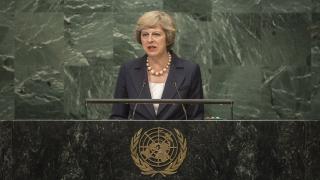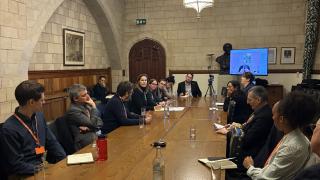
UNA-UK welcomed the holding of the UN General Assembly high-level summit "to address large movements of refugees and migrants". The summit's stated aim - bringing countries together behind a more humane and coordinated approach - is long overdue, as the world struggles to deal with the largest displacement crisis since records began.
The resulting New York Declaration set out member states' resolve to start negotiations on a new global compact on "safe, orderly and regular migration". While the rest of the statement largely reflects existing international obligations and commitments, leaving the hard work on legal and institutional reforms to a later date, the creation of a more responsible global system should not be underestimated. If adopted, it would see migration - a reality in our interconnected world - guided by common principles and approaches.
Two other developments merit praise: bringing the International Organization for Migration into the UN system, which will strengthen global governance and coordination; and the release of 20 draft principles on the human rights protection of migrants by the UN Office of the High Commissioner for Human Rights, which covers areas such as non-discrimination, rescue and assistance, and access to justice.
Beyond warm words?
While this progress is to be welcomed, warm words and promises are clearly not enough to deal with the ongoing crisis. The Leaders' summit co-hosted by the US, Canada, Ethiopia, Germany, Jordan, Mexico and Sweden in the margins of the General Assembly resulted in pledges of concrete support. 52 countries and international organisations - including 17 major refugee-hosting countries - announced commitments that increase their total financial contributions to international humanitarian appeals by $4.5 billion over 2015 levels; roughly double the number of refugees they have re-settled or admitted; improve access to education for one million refugee children; and improve access to lawful work for one million refugees globally.
But many leaders' statements at the General Assembly showed that there is still a long way to travel if we are to reach consensus on a humane and coordinated global approach.
The UK's approach
UNA-UK was pleased to see UK Prime Minister Theresa May use her first speech at the United Nations to reiterate Britain's commitment to multilateralism and universal values, and to call for a new approach to migration. It is a position that we have long shared. The current approach in many rich states, including the UK, raises serious questions about our commitment to the values of international cooperation, security and prosperity, which were cited in May's speech. With regard to refugees in particular, the current approach is short-sighted, wasting human potential by prioritising containment in camps over resettlement and prioritising response over prevention.
We were also pleased by her pledge of directing further financial resources towards humanitarian aid. Like our members and supporters around the country, we are proud that the UK is the second largest bilateral provider of assistance.
However, we were disappointed that May did not use this opportunity to set out a bold new vision for migration, or challenge some of misconceptions that persist around refugee flows. We were also disappointed that the UK did not join other states in committing to resettle more refugees.
May's three principles
In her speech, May pointed to three fundamental principles that should underpin a new global approach to migration:
- Ensuring that refugees claim asylum in the first safe country they reach, including by providing support to those countries
- Improving the methods of distinguishing between "economic migrants" and "refugees", including by ensuring proper application of the 1951 UN refugee convention
- Adopting a better approach to managing economic migrants, including countries' acceptance of their nationals being returned if not granted leave to remain elsewhere
On the first point, it is important to note that there is nothing in international law to this effect and, from a perspective of promoting integration and the contribution of refugees, there are cases where this may not be the best solution. In practice most refugees already claim asylum in the first safe country they reach. The top 10 refugee hosting countries all have conflict-ridden neighbours: Turkey, Jordan and Lebanon host most Syrian refugees; Pakistan has taken in the bulk of Afghan refugees; and Ethiopia, which shares a border with Somalia, Sudan and South Sudan, is the largest refugee host in Africa. Overall, developing countries host over 86 per cent of all refugees, with least-developed countries among the most generous hosts. May's call for further assistance to major host countries is therefore welcome.
So too is May's emphasis on improving how we distinguish between "economic migrants" and "refugees". UNA-UK believes, however, that it is not sufficient to call for proper application of the 1951 convention, which, as May points out, was developed in a radically different context to today. It therefore does not guarantee adequate protection for those fleeing generalised situations of violence (as opposed to individual persecution) or the growing number of people displaced by climate change.
This relates to May's third point. The term "economic migrant" - which has no legal weight - covers a huge range of people. It includes the London banker who moves to Frankfurt for a salary rise, but also people living in a failed state in extreme poverty, people whose basic rights and needs are not being met, and people fleeing modern slavery - which May highlighted in her speech. There is a strong case to be made that such individuals, who do not fit the narrow definition of "refugee" under the 1951 convention, should nonetheless be given similar protections.
Towards a new framework
So what should a new approach look like?
First, it should transform the narrative around migration. This means accepting that migration is inevitable in our interconnected world, and harnessing its opportunities, as well as managing the challenges it brings. It means recognising that refugees and migrants are not statistics, or problems to be tackled, but people who have, through choice or necessity, crossed a border - a right that few if any of us would be willing to give up.
Second, it should close the gaps in legal protections that currently exist, including by reviewing the definitions of "refugee" and "economic migrant". While states are likely to be reluctant to revisit the 1951 convention (indeed, it may be risky to seek to do so in the current climate), instruments need to be developed to tackle situations where people are falling through the cracks. This includes people in conflict zones who face daily threats through bombs but do not meet the 1951 convention test of persecution; the rapidly increasing number of people who are displaced as a result of climate change; and people fleeing human rights abuses and extreme poverty. Regions such as Africa and Latin America have already adopted instruments that address some of these concerns.
Third, it should ensure that policies are based on fact and not fear. This means providing accurate information to the public and improving the quality of debate. Despite the rhetoric from some politicians and media outlets, just 3.3% of the world's population are migrants. Nearly three-quarters of migrants move within their own country, and of those who do cross borders, more than half migrate from one developing country to another. Similarly, evidence from international organisations and countries around the world shows that while migration may cause short-term challenges, it remains the case that migration benefits both host countries and the countries that migrants leave behind. Remittances from migrants, for example, far outstrips official development assistance, thereby contributing to tackling some of the root causes of migration. It also means implementing policies that have had a marked impact on reducing human suffering even if they are unpopular. EU search-and-rescue operations are one example. Since Italy’s Mare Nostrum missions were suspended in 2014, the number of people crossing the Mediterranean has remained roughly the same, but the death toll has risen by some 15 per cent.
Fourth, it should move towards more equal sharing of responsibilities. Mass displacement is not a Western issue, nor indeed a new issue. UNA-UK believes that many Western government's - including the UK - have grown accustomed to the humanitarian system acting as a buffer that insulates them from crises in other countries, including places such as Libya, Iraq and Yemen, where their actions have contributed to the flow of people. Now that the system is under duress, with UN agencies running out of money, we are seeing the effects on our doorstep. Developing countries, including some of the world's poorest, have been dealing with mass influxes of people for decades, and they continue to do so. Western countries need to move beyond an aid-based approach and commit to hosting and resettling more refugees and migrants.
Fifth, it should include corresponding links to frameworks and tools that are vital to tackling the root causes of migration, such as the Paris Agreement on climate change, the Sustainable Development Goals and UN peace operations.
The UK's role
While commending the initiatives set out by the Prime Minister at the Leaders' Summit, UNA-UK hopes that the UK will raise its game and display leadership at the the UN in terms of pushing forward the bold new migration framework the world needs, and by setting a good example through its own policies. This should include increased practical support for UN peace operations, which the UK is already beginning to provide; foreign and development policies that prioritise human rights protection and the prevention of mass atrocities; and swift ratification and progressive implementation of the Paris Agreement.
May is right to acknowledge that she represents the British public, which includes a significant number of people who are concerned about migration. Many other leaders and countries are in the same position.
In his remarks to the Summit, the UN High Commissioner on Human Rights noted:
[T]he defenders of what is good and right are being outflanked, in too many countries, by race-baiting bigots, who seek to gain, or retain, power by wielding prejudice and deceit, at the expense of those most vulnerable – and, ultimately, even those who support them initially.
An epidemic, an epidemic of amnesia is at the heart of this moral collapse in some quarters. Many seem to have forgotten the two world wars – what happens when fear and anger are stoked by half-truths and outright lies. A density of hatred builds up. The pin is pulled. The timer, released. And humanity's rendez-vous with the 'demon of world history' beckons again.
Borne out of the devastation wrought by the Second World War and the horrors of the Holocaust, the United Nations was created to serve all the world's people. As the global displacement crisis has shown, the line between national and international interest is disappearing. Countries need to set aside narrow national agendas; they must recognise that tackling global challenges, investing in the international system and showing solidarity will ultimately benefit their own people too.
This will require real leadership, including the courage to address domestic concerns and opposition. UNA-UK hopes that May will deliver.
Photo: Prime Minister of United Kingdom Addresses General Assembly. Copyright UN Photo/Cia Pak






